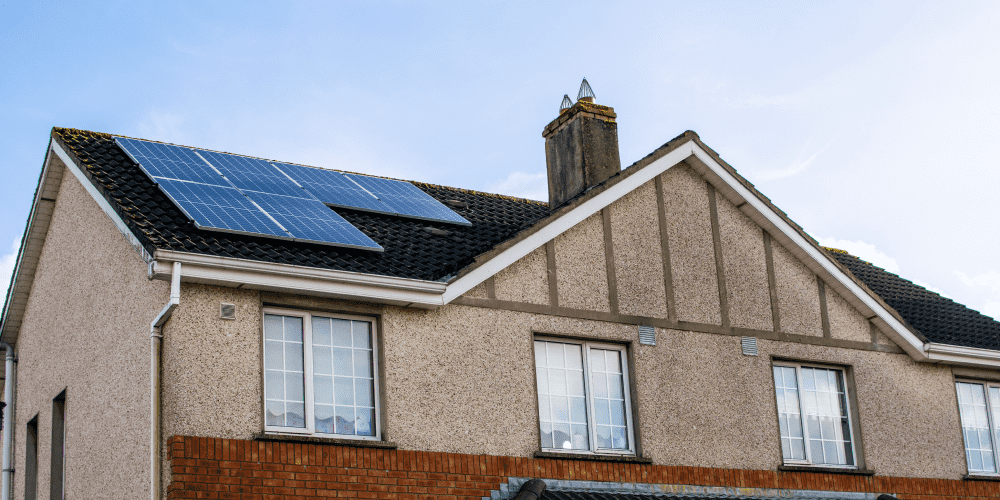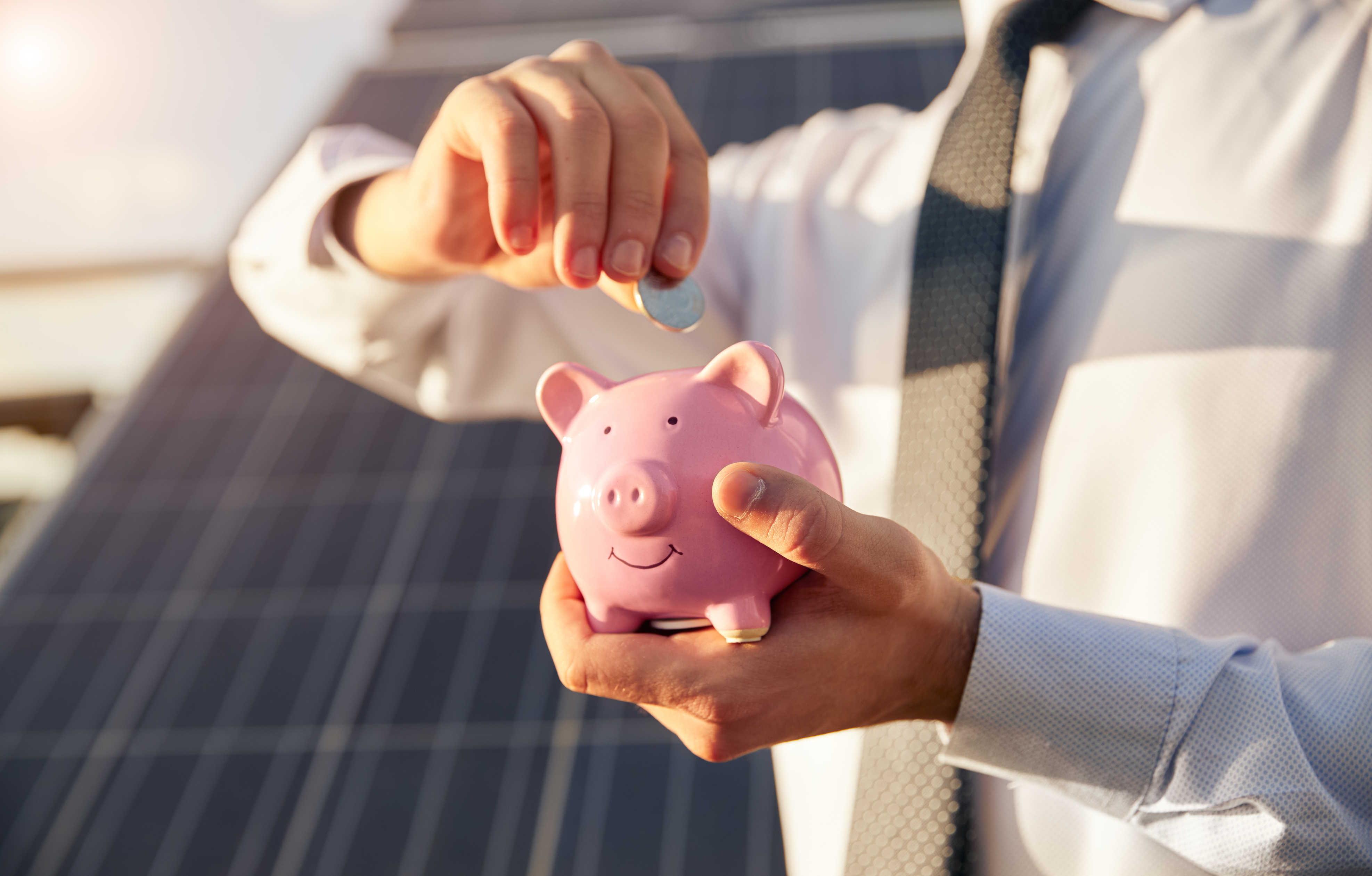Solar panels: Are they worth it for UK homeowners?
Thanks to better affordability and falling payback times, solar panels are now one of the smartest investments UK households can make.
Modern UK solar systems pay for themselves within around a decade, after which they deliver many years of free electricity, with high-quality panels remaining efficient for 25 years-plus.
Solar panels require daylight, rather than direct sunlight to produce power, making them ideal for the UK climate.
Most households enjoy substantial annual savings while earning payments for the excess energy they export back to the grid.
Meanwhile, mild UK temperatures help systems run more efficiently than in hotter climates.
With falling costs, zero per cent VAT until 2027, and improved government support, investing in solar power has never been more accessible for UK homeowners.
Solar panel costs: What should UK homes expect?
You can generally expect the project to set you back between £5,000 and £8,000. MoneySavingExpert estimates the average cost of having solar panels installed is £6,100.
A battery, an optional extra, will cost around £8,000 but can also increase savings in the long run by allowing you to store excess energy or export electricity when prices are at their highest.
System size is the biggest cost driver – a typical 4kW system for an average home costs less than a larger 6kW installation for high-energy households.
Solar panel costs have fallen dramatically over recent years while efficiency has improved.

In the 2024–25 fiscal year, the median panel cost per kW dropped by roughly 20 per cent compared to the previous year, according to the Department of Energy Security and Net Zero.
Essentially, this means you'll be generating more power per pound spent than you would have in previous years.
Finally, support makes solar even more affordable. Installation is VAT-free until 2027, saving hundreds of pounds immediately.
Some regions offer additional grants – Scotland provides up to £9,000 for solar and battery systems, while schemes in Wales, England, and Northern Ireland help low-income households access free installations.
How long does it take for solar panels to pay for themselves?
The time it takes for solar panel systems to pay for themselves has decreased significantly in recent years.
Between October 2020 and January 2024, the payback period for a 3kWp system fell from 16 years to just 10, according to climate analysis and data provider Carbon Brief.
Given that solar panels last for 25-30 years, this means that you'll continue saving long after your investment has paid for itself.

The total cost of the system is one factor that affects payback time, while your location is another consideration.
For example, homes further south will produce more energy and see a return more quickly, as they receive more daylight.
MoneySavingExpert estimates that the average break-even time in London would be 10-11 years compared to 12-13 in Edinburgh.
Energy prices will also impact when your panels deliver a return on your investment, with higher prices resulting in greater savings for households.
How much could you save with solar panels?
UK government figures say homeowners could save around £500 a year, while other estimates put potential solar savings at £500–£700, with additional Smart Export Guarantee (SEG) payments amounting to an additional £150-£200.
SEG payments are made when you export excess energy back to the grid.
Your savings will depend on a few things, like:
- How much solar energy you use yourself during the day.
- Whether you sign up for the SEG.
- Where you live also matters — areas further south tend to get more daylight, increasing energy generation.
A reputable solar panel installer will design a bespoke system for your home that will help maximise your savings.
How to get the most out of your solar installation
Save up to £800 a year
Installing solar panels can drastically reduce your electricity bills.

There are several steps you can take to ensure you get the most value out of your solar installation.
Firstly, you should only choose to have an MCS-certified installer fit your panels.
This not only means you'll have a bespoke system designed to maximise efficiency and savings, but also that you'll be able to set up SEG payments, as using a certified installer is one of the main requirements.
When choosing an installer, consumer organisation Which? recommends getting up to at least three quotes to ensure you get the best deal.
System sizing matters more than you might think. An oversized system costs more upfront without proportional benefits, while an undersized system misses potential savings.
Quality installers will design systems based on your actual energy consumption, not just available roof space.
READ ALSO: How to have solar panels installed
Ready to start saving?
With energy savings of up to £700 per year, additional payments through the SEG, and system payback times now as low as 8 to 10 years, solar panels are a smart long-term investment for UK homeowners.
We can help you take the next step by connecting you with certified local installers.
Our service is free and non-binding — simply tell us a bit about your home, and we'll take care of the rest.
Frequently asked questions
Do solar panels work on cloudy days in the UK?
Yes, solar panels work perfectly well on cloudy days. They need daylight, not direct sunlight, to generate electricity.
The UK's diffused light is ideal for solar generation. While output is lower on overcast days compared to sunny ones, panels still produce significant energy year-round.
Learn more about how solar panels work in UK weather conditions.
Do I need planning permission for solar panels?
Most UK homes don't need planning permission for rooftop solar panels. They're covered under permitted development rights.
Exceptions include listed buildings, conservation areas, and some installations that exceed size limits or face onto highways.
You can read more about the permitted development rules here.
How much roof space do I need for solar panels?
A typical 4kW system needs around 20-25 square metres of roof space. That's roughly equivalent to 8-10 panels.
The exact amount depends on panel efficiency and your energy needs. An MCS-certified installer will assess your roof and design a system that fits your available space and consumption patterns.
What maintenance do solar panels require?
Solar panels need very little maintenance. UK rain naturally cleans most panels, removing dust and debris.
An annual visual check for damage or shading is recommended. Professional maintenance isn't usually necessary, though some homeowners opt for a check every few years.
Can I add a battery later if I don't get one now?
Yes, you can add a battery to your solar system at any time. Many homeowners start with panels only and add storage later.
Battery prices are falling, so waiting can sometimes mean better value. Your installer can design your initial system to be battery-ready, making future upgrades straightforward.
About Solarenergy.co.uk
We're a service that helps UK households find the right solar panel solution. Our experienced team makes it easy to obtain offers from multiple qualified installers.
Save time researching suppliers yourself - we bring installers directly to you, so you can choose the solution that's best for your home.







